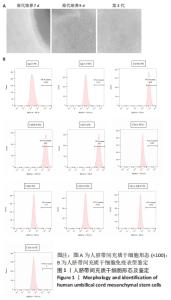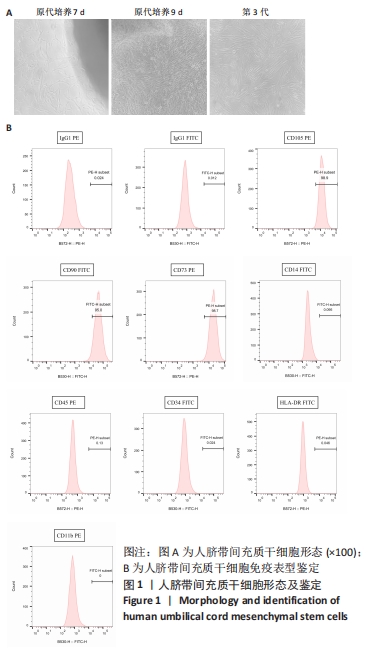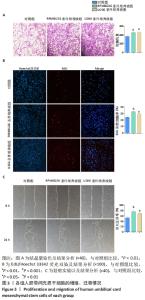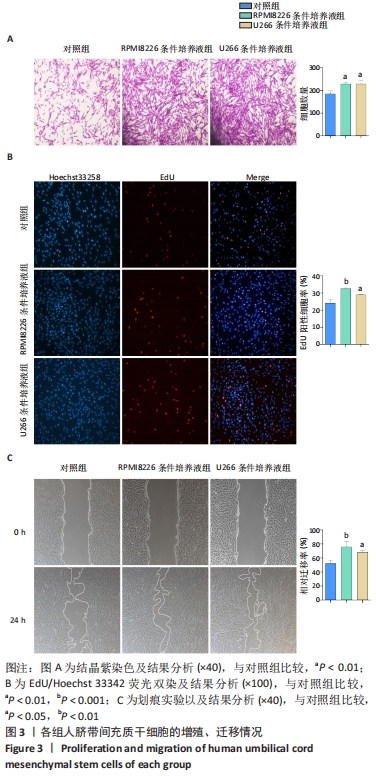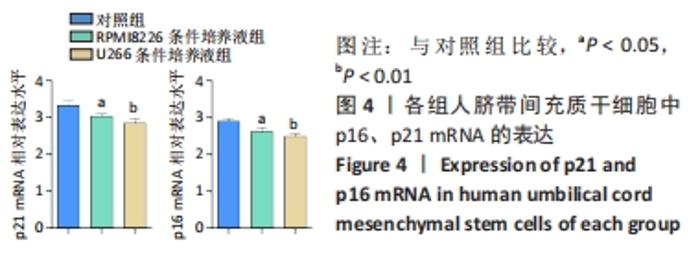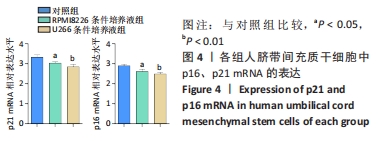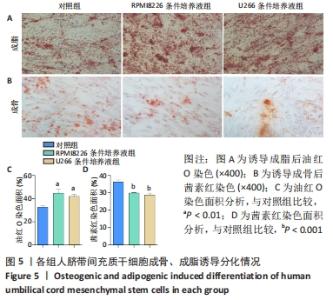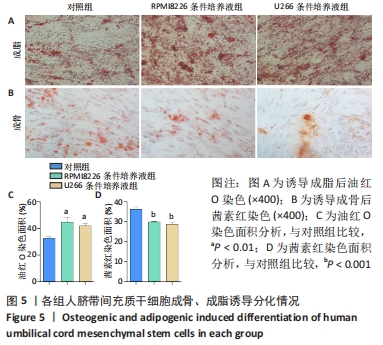Chinese Journal of Tissue Engineering Research ›› 2023, Vol. 27 ›› Issue (10): 1514-1520.doi: 10.12307/2023.287
Previous Articles Next Articles
Effects of multiple myeloma cell conditioned medium on proliferation and differentiation of human umbilical cord mesenchymal stem cells
Yang Xu1, Wang Feiqing2, Zhao Jianing1, Zhang Chike3, Liang Huiling1, Qi Shasha3, Wu Dan1, Liu Yanqing2, Tang Dongxin2, Liu Yang1, 2, 4, Li Yanju3
- 1Guizhou University of Traditional Chinese Medicine, Guiyang 550025, Guizhou Province, China; 2First Affiliated Hospital of Guiyang University of Traditional Chinese Medicine, Guiyang 550001, Guizhou Province, China; 3Affiliated Hospital of Guizhou Medical University, Guiyang 550004, Guizhou Province, China; 4Key Laboratory of Adult Stem Cell Translational Research, Chinese Academy of Medical Sciences, Guiyang 550004, Guizhou Province, China
-
Received:2022-03-02Accepted:2022-05-19Online:2023-04-08Published:2022-09-07 -
Contact:Liu Yang, MD, Associate professor, Guizhou University of Traditional Chinese Medicine, Guiyang 550025, Guizhou Province, China; First Affiliated Hospital of Guiyang University of Traditional Chinese Medicine, Guiyang 550001, Guizhou Province, China; Key Laboratory of Adult Stem Cell Translational Research, Chinese Academy of Medical Sciences, Guiyang 550004, Guizhou Province, China Li Yanju, MD, Chief physician, Affiliated Hospital of Guizhou Medical University, Guiyang 550004, Guizhou Province, China -
About author:Yang Xu, Master candidate, Guizhou University of Traditional Chinese Medicine, Guiyang 550025, Guizhou Province, China -
Supported by:the National Natural Science Foundation of China, No. 31660326 (to LY); the National Natural Science Foundation of China, No. 82160519 (to LYJ); the Research Innovation and Exploration Fund of National Natural Science Foundation of China, No. 2019YFC171250407 (to LY); the Research Innovation and Exploration Fund of National Natural Science Foundation of China, No. 2019YFC171250505 (to WFQ); China Postdoctoral Science Foundation, No. 2018M640938 (to LY); China Postdoctoral Science Foundation, No. 43XB3794XB (to LYJ); the grant from the Science and Technology Department of Guizhou Province, No. [2016]1019 (to LY); the grant from the Science and Technology Department of Guizhou Province, No. LH[2017]7140 (to LYQ)
CLC Number:
Cite this article
Yang Xu, Wang Feiqing, Zhao Jianing, Zhang Chike, Liang Huiling, Qi Shasha, Wu Dan, Liu Yanqing, Tang Dongxin, Liu Yang, Li Yanju. Effects of multiple myeloma cell conditioned medium on proliferation and differentiation of human umbilical cord mesenchymal stem cells[J]. Chinese Journal of Tissue Engineering Research, 2023, 27(10): 1514-1520.
share this article
Add to citation manager EndNote|Reference Manager|ProCite|BibTeX|RefWorks
| [1] KUMAR SK, RAJKUMAR V, KYLE RA, et al. Multiple myeloma. Nat Rev Dis Primers. 2017;3:17046. [2] VAN DE DONK NWCJ, PAWLYN C, YONG KL. Multiple myeloma. Lancet. 2021;397(10272):410-427. [3] JI LL, SONG G, JIANG LM, et al. Evaluation of conditioned medium from placenta-derived mesenchymal stem cells as a storage medium for avulsed teeth: An in vitro study. Dent Traumatol. 2021;37(1):73-80. [4] 李若林,王禹,姚奕斌,等.多发性骨髓瘤生物标志物的研究进展[J].右江医学,2021,49(11):861-864. [5] GIALLONGO C, TIBULLO D, CAMIOLO G, et al. TLR4 signaling drives mesenchymal stromal cells commitment to promote tumor microenvironment transformation in multiple myeloma. Cell Death Dis. 2019;10(10):704. [6] GIALLONGO C, DULCAMARE I, TIBULLO D, et al. CXCL12/CXCR4 axis supports mitochondrial trafficking in tumor myeloma microenvironment. Oncogenesis. 2022;11(1):6. [7] DENG M, YUAN H, LIU S, et al. Exosome-transmitted LINC00461 promotes multiple myeloma cell proliferation and suppresses apoptosis by modulating microRNA/BCL-2 expression. Cytotherapy. 2019;21(1): 96-106. [8] MATULA Z, MIKALA G, LUKÁCSI S, et al. Stromal Cells Serve Drug Resistance for Multiple Myeloma via Mitochondrial Transfer: A Study on Primary Myeloma and Stromal Cells. Cancers (Basel). 2021; 13(14):3461. [9] LIN X, YANG L, WANG G, et al. Interleukin-32α promotes the proliferation of multiple myeloma cells by inducing production of IL-6 in bone marrow stromal cells. Oncotarget. 2017;8(54):92841-92854. [10] BÉRÉZIAT V, MAZURIER C, AUCLAIR M, et al. Systemic Dysfunction of Osteoblast Differentiation in Adipose-Derived Stem Cells from Patients with Multiple Myeloma. Cells. 2019;8(5):441. [11] FALANK C, FAIRFIELD H, REAGAN MR. Signaling Interplay between Bone Marrow Adipose Tissue and Multiple Myeloma cells. Front Endocrinol (Lausanne). 2016;7:67. [12] HOU C, SHEN L, HUANG Q, et al. The effect of heme oxygenase-1 complexed with collagen on MSC performance in the treatment of diabetic ischemic ulcer. Biomaterials. 2013;34(1):112-120. [13] YAN S, LIU H, LIU Z, et al. CCN1 stimulated the osteoblasts via PTEN/AKT/GSK3β/cyclinD1 signal pathway in Myeloma Bone Disease. Cancer Med. 2020;9(2):737-744. [14] MORRIS EV, SUCHACKI KJ, HOCKING J, et al. Myeloma Cells Down-Regulate Adiponectin in Bone Marrow Adipocytes Via TNF-Alpha. J Bone Miner Res. 2020;35(5):942-955. [15] KASTRITIS E, TERPOS E, DIMOPOULOS MA. How I treat relapsed multiple myeloma. Blood. 2022;139(19):2904-2917. [16] COHEN YC, ZADA M, WANG SY, et al. Identification of resistance pathways and therapeutic targets in relapsed multiple myeloma patients through single-cell sequencing. Nat Med. 2021;27(3):491-503. [17] SABATTINI E, BACCI F, SAGRAMOSO C, et al. WHO classification of tumours of haematopoietic and lymphoid tissues in 2008: an overview. Pathologica. 2010;102(3):83-87. [18] WU D, GUO X, SU J, et al. CD138-negative myeloma cells regulate mechanical properties of bone marrow stromal cells through SDF-1/CXCR4/AKT signaling pathway. Biochim Biophys Acta. 2015;1853(2): 338-347. [19] GARCIA-GOMEZ A, DE LAS RIVAS J, OCIO EM, et al. Transcriptomic profile induced in bone marrow mesenchymal stromal cells after interaction with multiple myeloma cells: implications in myeloma progression and myeloma bone disease. Oncotarget. 2014;5(18): 8284-8305. [20] NOLL JE, WILLIAMS SA, PURTON LE, et al. Tug of war in the haematopoietic stem cell niche: do myeloma plasma cells compete for the HSC niche? Blood Cancer J. 2012;2(9):e91. [21] MAISO P, MOGOLLÓN P, OCIO EM, et al. Bone Marrow Mesenchymal Stromal Cells in Multiple Myeloma: Their Role as Active Contributors to Myeloma Progression. Cancers (Basel). 2021;13(11):2542. [22] REAGAN MR, GHOBRIAL IM. Multiple myeloma mesenchymal stem cells: characterization, origin, and tumor-promoting effects. Clin Cancer Res. 2012;18(2):342-349. [23] HIDESHIMA T, ANDERSON KC. Signaling Pathway Mediating Myeloma Cell Growth and Survival. Cancers (Basel). 2021;13(2):216. [24] ZHANG L, LI K, LIU X, et al. Repeated systemic administration of human adipose-derived stem cells attenuates overt diabetic nephropathy in rats. Stem Cells Dev. 2013;22(23):3074-3086. [25] LI Q, PANG Y, LIU T, et al. Effects of human umbilical cord-derived mesenchymal stem cells on hematologic malignancies. Oncol Lett. 2018;15(5):6982-6990. [26] CIAVARELLA S, CASELLI A, TAMMA AV, et al. A peculiar molecular profile of umbilical cord-mesenchymal stromal cells drives their inhibitory effects on multiple myeloma cell growth and tumor progression. Stem Cells Dev. 2015;24(12):1457-1470. [27] CHENG Q, LI X, LIU J, et al. Multiple Myeloma-Derived Exosomes Regulate the Functions of Mesenchymal Stem Cells Partially via Modulating miR-21 and miR-146a. Stem Cells Int. 2017;2017:9012152. [28] NOLL JE, WILLIAMS SA, TONG CM, et al. Myeloma plasma cells alter the bone marrow microenvironment by stimulating the proliferation of mesenchymal stromal cells. Haematologica. 2014;99(1):163-171. [29] LIU Z, LIU H, LI Y, et al. Multiple myeloma-derived exosomes inhibit osteoblastic differentiation and improve IL-6 secretion of BMSCs from multiple myeloma. J Investig Med. 2020;68(1):45-51. [30] DE VEIRMAN K, WANG J, et al. Induction of miR-146a by multiple myeloma cells in mesenchymal stromal cells stimulates their pro-tumoral activity. Cancer Lett. 2016;377(1):17-24. [31] DABBAH M, ATTAR-SCHNEIDER O, ZISMANOV V, et al. Multiple myeloma cells promote migration of bone marrow mesenchymal stem cells by altering their translation initiation. J Leukoc Biol. 2016;100(4):761-770. [32] TANG H, XU L, LIANG X, et al. Low dose dinaciclib enhances doxorubicin-induced senescence in myeloma RPMI8226 cells by transformation of the p21 and p16 pathways. Oncol Lett. 2018;16(5): 6608-6614. [33] XIANG P, YEUNG YT, WANG J, et al. miR-17-3p promotes the proliferation of multiple myeloma cells by downregulating P21 expression through LMLN inhibition. Int J Cancer. 2021;148(12):3071-3085. [34] YAO R, HAN D, SUN X, et al. Histone deacetylase inhibitor NaBut suppresses cell proliferation and induces apoptosis by targeting p21 in multiple myeloma. Am J Transl Res. 2017;9(11):4994-5002. [35] JIA Y, ZHOU J, TAN TK, et al. Super Enhancer-Mediated Upregulation of HJURP Promotes Growth and Survival of t(4;14)-Positive Multiple Myeloma. Cancer Res. 2022;82(3):406-418. [36] FAICT S, MULLER J, DE VEIRMAN K, et al. Exosomes play a role in multiple myeloma bone disease and tumor development by targeting osteoclasts and osteoblasts. Blood Cancer J. 2018;8(11):105. [37] YEN CH, HSU CM, HSIAO SY, et al. Pathogenic Mechanisms of Myeloma Bone Disease and Possible Roles for NRF2. Int J Mol Sci. 2020;21(18): 6723. [38] GIULIANI N, RIZZOLI V. Myeloma cells and bone marrow osteoblast interactions: role in the development of osteolytic lesions in multiple myeloma. Leuk Lymphoma. 2007;48(12):2323-2329. [39] LOMAS OC, TAHRI S, GHOBRIAL IM. The microenvironment in myeloma. Curr Opin Oncol. 2020;32(2):170-175. [40] ZHANG L, LEI Q, WANG H, et al. Tumor-derived extracellular vesicles inhibit osteogenesis and exacerbate myeloma bone disease. Theranostics. 2019;9(1):196-209. [41] FAN FY, DENG R, LAI SH, et al. Inhibition of microRNA-221-5p induces osteogenic differentiation by directly targeting smad3 in myeloma bone disease mesenchymal stem cells. Oncol Lett. 2019;18(6):6536-6544. [42] TAKEUCHI K, ABE M, HIASA M, et al. Tgf-Beta inhibition restores terminal osteoblast differentiation to suppress myeloma growth. PLoS One. 2010;5(3):e9870. [43] GUO J, ZHAO Y, FEI C, et al. Dicer1 downregulation by multiple myeloma cells promotes the senescence and tumor-supporting capacity and decreases the differentiation potential of mesenchymal stem cells. Cell Death Dis. 2018;9(5):512. [44] FAIRFIELD H, DUDAKOVIC A, KHATIB CM, et al. Myeloma-Modified Adipocytes Exhibit Metabolic Dysfunction and a Senescence-Associated Secretory Phenotype. Cancer Res. 2021;81(3):634-647. [45] JAFARI A, FAIRFIELD H, ANDERSEN TL, et al. Myeloma-bone marrow adipocyte axis in tumour survival and treatment response. Br J Cancer. 2021;125(6):775-777. [46] PANARONI C, FULZELE K, MORI T, et al. Multiple myeloma cells induce lipolysis in adipocytes and uptake fatty acids through fatty acid transporter proteins. Blood. 2022;139(6):876-888. [47] LIU H, HE J, KOH SP, et al. Reprogrammed marrow adipocytes contribute to myeloma-induced bone disease. Sci Transl Med. 2019;11(494): eaau9087. |
| [1] | Liu Xiaolin, Mu Xinyue, Ma Ziyu, Liu Shutai, Wang Wenlong, Han Xiaoqian, Dong Zhiheng. Effect of hydrogel-loaded simvastatin microspheres on osteoblast proliferation and differentiation [J]. Chinese Journal of Tissue Engineering Research, 2023, 27(7): 998-1003. |
| [2] | Qiao Luhui, Ma Ziyu, Guo Haoyu, Hou Yudong. Comparison of puerarin and icariin on the biological properties of mouse preosteoblasts [J]. Chinese Journal of Tissue Engineering Research, 2023, 27(6): 872-877. |
| [3] | Hao Liufang, Duan Hongmei, Wang Zijue, Hao Fei, Hao Peng, Zhao Wen, Gao Yudan, Yang Zhaoyang, Li Xiaoguang. Spatiotemporal dynamic changes of ependymal cells after spinal cord injury in transgenic mice [J]. Chinese Journal of Tissue Engineering Research, 2023, 27(6): 883-889. |
| [4] | Li Long, Li Guangdi, Shi Hao, Deng Keqi. Circular RNA as a competing endogenous RNA is involved in the regulation of osteoarthritis [J]. Chinese Journal of Tissue Engineering Research, 2023, 27(5): 751-757. |
| [5] | Wang Huanhuan, Wang Qing, Tang Peng, Zhang Rui, Min Hongwei. Effects of extracorporeal shock wave on the proliferation and autophagy of chondrocytes from osteoarthritis rats [J]. Chinese Journal of Tissue Engineering Research, 2023, 27(2): 252-257. |
| [6] | Zhang Rui, Liu Lan, Xie Defu, Lin Yingxi, Ren Hongjing, Yan Hong. Effect of adipose-derived stem cells stimulated by direct current electric field on refractory wound healing in diabetic rats [J]. Chinese Journal of Tissue Engineering Research, 2023, 27(10): 1484-1491. |
| [7] | Wang Zhaoxin, Nijati•Tursun, Dai Huijuan, Wang Junxiang, Xiaheida•Yilaljiang, Li Shuhui. Effect of macrophage inflammatory protein-1 alpha on the biological behavior of human periodontal ligament stem cells [J]. Chinese Journal of Tissue Engineering Research, 2023, 27(10): 1521-1527. |
| [8] | Chen Jiana, Nie Minhai, Hu Xinyue, Liu Xuqian. Platelet-derived growth factor BB promotes proliferation and osteogenic differentiation of human periodontal ligament stem cells [J]. Chinese Journal of Tissue Engineering Research, 2023, 27(10): 1534-1540. |
| [9] | Zhou Jingjing, Sun Yixin, Sheng Yang, Zhang Rong. Effects of chiral polyethyleneimine/graphene oxide/phenylalanine interface on adhesion and proliferation of multilineage-differentiating stress enduring cells [J]. Chinese Journal of Tissue Engineering Research, 2023, 27(10): 1547-1552. |
| [10] | Xing Guoyi, Sun Legang, Ma Xiangrui, Wang Wenlong. Regulation of Sema3A on oral mesenchymal stem cell function [J]. Chinese Journal of Tissue Engineering Research, 2023, 27(10): 1626-1633. |
| [11] | Liu Siqi, Wu Mingrui, Qiao Lingran, Xie Liying, Chen Siyu, Han Zhibo, Zuo Lin. Effects of hydrogel loaded with human umbilical cord mesenchymal stem cells on diabetic wound repair in mice [J]. Chinese Journal of Tissue Engineering Research, 2023, 27(1): 21-27. |
| [12] | Wei Yanzhao, Zheng Xiaohan, Gao Shijun, Huang Ting, Wei Xufang, Chen Xinxu, Zhao Zhenqiang. Expression of autocrine macrophage migration inhibitory factor and its receptors of human embryonic stem cells [J]. Chinese Journal of Tissue Engineering Research, 2023, 27(1): 34-41. |
| [13] | Yang Yan, Wang Jingxian, Zhang Ronghong, Li Chen, Fan Anran, Cui Dongbing, Wu Shumei. Effects of conditioned media of different sources on the proliferation of human dental pulp stem cells [J]. Chinese Journal of Tissue Engineering Research, 2023, 27(1): 49-53. |
| [14] | Lan Qian, Gu Yangcong, Xiao Xin, Bi Xueting, Li Na. Human periodontal ligament stem cells-derived exosomes interfere with the proliferation and differentiation of MC3T3-E1 cells [J]. Chinese Journal of Tissue Engineering Research, 2023, 27(1): 54-58. |
| [15] | Zhang Jinglan, Zhang Binjing, Chen Yifei, Zhang Chenyue, Hu Zhiai, Hu Haikun. Biological effects of magnetic field on osteogenesis of mesenchymal stem cells [J]. Chinese Journal of Tissue Engineering Research, 2023, 27(1): 145-151. |
| Viewed | ||||||
|
Full text |
|
|||||
|
Abstract |
|
|||||
